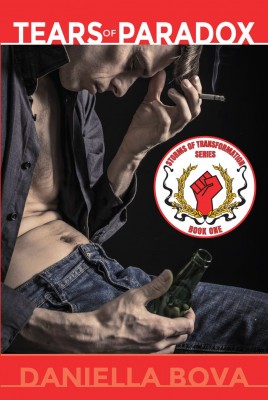My Pius Trilogy discussed the war on God, waged by your standard, everyday "liberal" who is more concerned with their own whims, and their own political power, than any right given to faith, the faithful, or respect for God.
Heck, in my novel, A Pius Legacy: A Political Thriller, I give good "liberals" what they want, and I literally put the Pope on trial for war crimes and crimes against humanity. After all, the Pope is against things like abortion, women priests, birth prevention (sorry, "birth control"), and other horrible, horrible stances [read: sarcasm, lots of it].
As part of the Pope's defense, I chronicled a small sample of what the world has been doing lately in its war on God.
Tears of Paradox is what happens if that war is lost.
The Storms of Transformation are here, bringing upheaval, division and isolation. As the nation fundamentally transforms, small-town America is caught in the whirlwind.
Jason married the girl next door. He and Michelle dreamed of raising their children among family and friends in their idyllic, peaceful hometown. But then the Storms begin. Friendships disintegrate, fathers and sons become enemies, and trust is a thing of the past. The old ways have become what those in power term evil. What used to be evil is now the law. The evil brings with it a creeping darkness, gradually overshadowing the town’s inhabitants and turning their lives upside-down.
The Storms force pregnant Michelle to hide alone in a basement, far from home. Jason remains in town, living a lie as he tries to conceal the truth from the authorities. But will their own flesh-and-blood betray them? The town keeps many secrets. How did such a thing ever come to pass?
We've got a two-tier story going on here. It'll throw some at first, especially since they take place at two different points in time. Both points of view are from a married couple, Jason and Michelle. Michelle narrates a point in the future, where -- as James Clavell once put it -- they have won. Jason narrates a tale of love and personal redemption, leading up to the dystopia that Michelle talks of. After the first chapter, you catch on rather quickly. But it takes some time to adapt.
The two narratives complement each other perfectly, each offering commentary on the other. It's a nice balancing act that I don't see that often -- attempted but failed on Lost, mostly perfected on Arrow -- and it works, once you see what Madame Bova is doing.
The sad thing here is that there's nothing that novel about this dystopia. Easily 90% of it is just the reasonable and rational conclusion of current insanity. When exactly do we get to the point where private citizens are forced to keep Christmas lights indoors because atheists can't be bothered teaching their children about religion? Healthcare has already been expanded to include abortion, so what's the next logical step in the progression? Conscience laws have been under attack for years, how long until they're gone completely?
A lot of people use the term "slippery slope" to be dismissive. Tears of Paradox shows us that it's more than some political talking point. It also shows us that the slope doesn't need to be all that slippery, because we're already halfway down the incline. It's what happens when good people stop fighting, because evil doesn't sleep, doesn't rest, and doesn't stop.
Tears of Paradox is also a journey about running on faith when there's nothing left to run on. Faith, a lot of prayer, knowing when to talk away, when to run, and when to fight.
When I was in college, I took a course on the philosophy of literature. Most of it consisted of traditional Catholic books -- Walker Percy, Graham Greene, Bernanos, Gabriel Marcel, Endo, a few others. At the end of the day, Daniella Bova belongs with all of them. For those who are overly well-read in Catholic literature, imagine if Walker Percy's Love in the Ruins was instead written by Graham Greene, with Percy coming in after to make it less suicide-inducing.
At the end of the day, Tears of Paradox is a work of literature, but don't hold that against it.
Support the work we do at CatholicMom.com by purchasing any of these books through our affiliate link! You pay nothing extra!
Copyright 2015 John Konecsni
About the Author

Guest
We welcome guest contributors who graciously volunteer their writing for our readers. Please support our guest writers by visiting their sites, purchasing their work, and leaving comments to thank them for sharing their gifts here on CatholicMom.com. To inquire about serving as a guest contributor, contact editor@CatholicMom.com.



.png?width=1806&height=731&name=CatholicMom_hcfm_logo1_pos_871c_2728c%20(002).png)
Comments